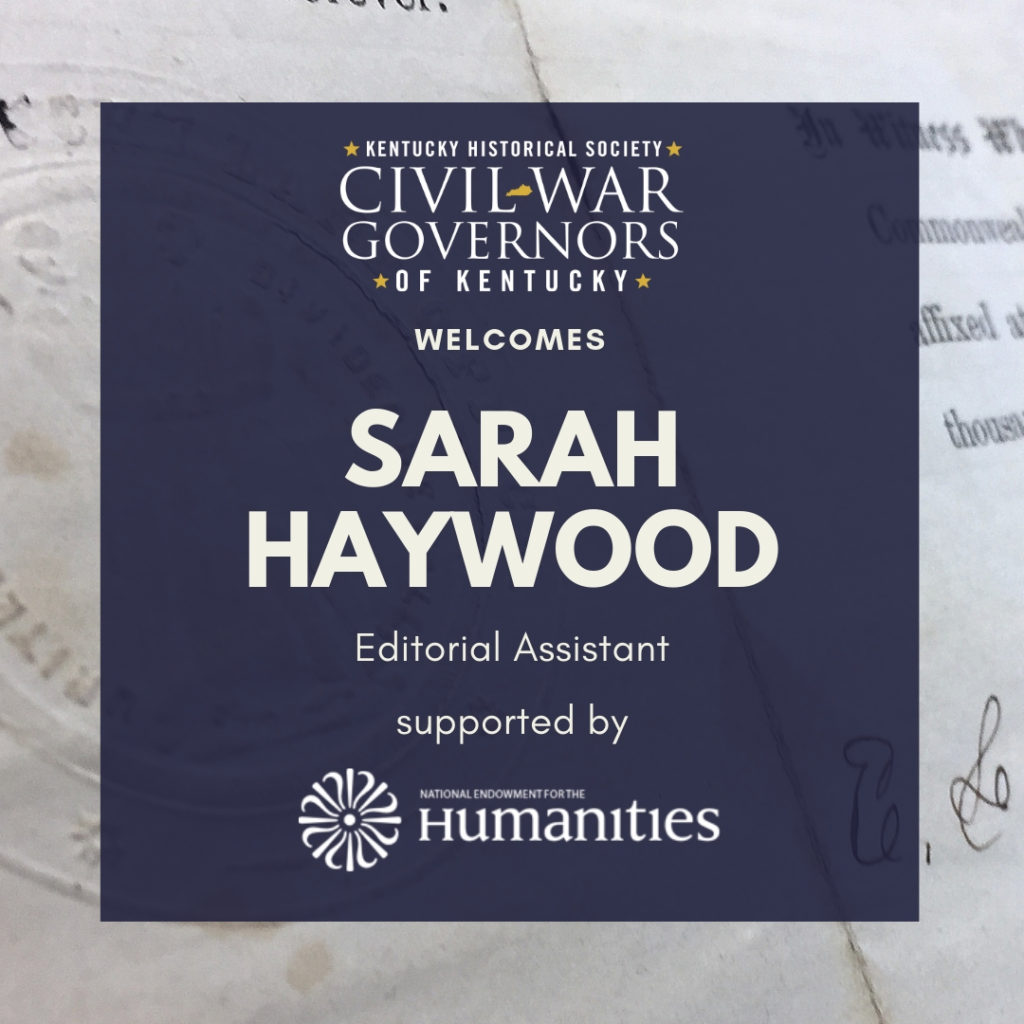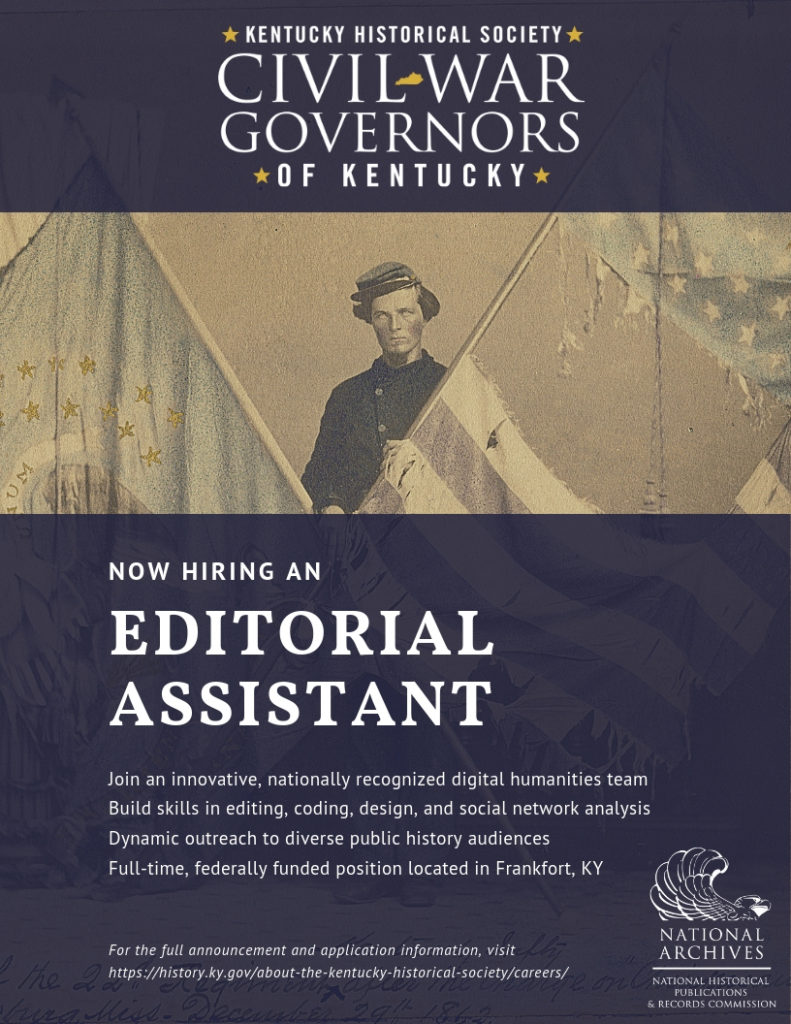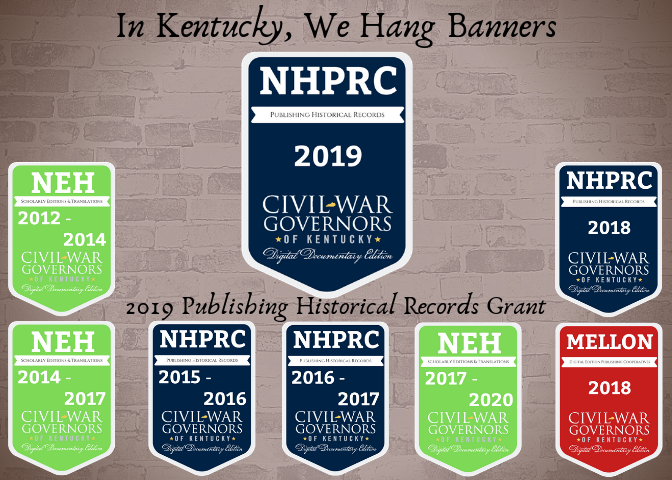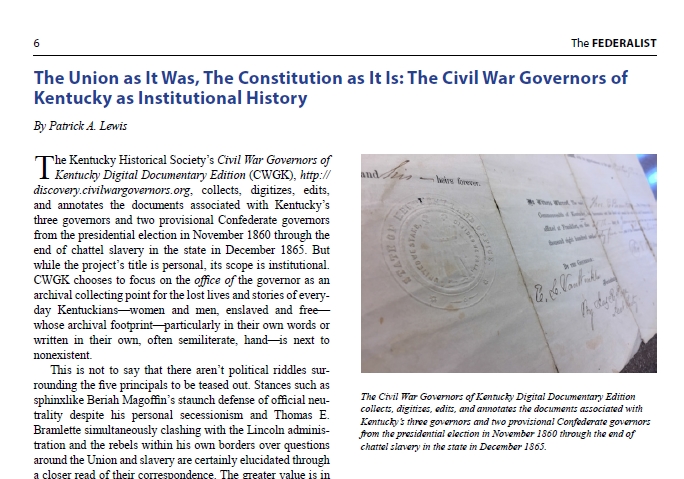The Problem
For as much work as CWGK has done to highlight the voices of the socially powerless, an equally important component of the project will be finding more and better documentation on the influential Confederate minority in the state. Curiously, for as heavily weighted as Civil War memory and, until recently, historiography has been towards the Confederacy, there is still a dearth of contemporary evidence from the pens of those engaged in rebellion against the state and the nation. Unlike the states which unambiguously seceded and brought with them their administrative apparatus, Kentucky Confederates (civil and military) were figureheads focused more on revolution than governing. They left little surviving paper.
The place of 1860s primary evidence has been taken by memoir, reminiscence, and Lost Cause-influenced history writing of the late nineteenth century. Recent historiography has made scholars wary of these flawed sources, but outside of them there has been terribly little with which to mount a substantial reevaluation of the Confederate movement in Kentucky. In the absence of a compelling new narrative that shows the detachment of secessionist motivations and activities from the interests of the majority of Kentucky citizens, myths about a nostalgic Confederate past still linger in the public sphere. KHS can facilitate the research, publications, and public programming that can change this narrative, but CWGK’s work is the foundational step.
CWGK can do some of this through existing documents within its corpus. Sometimes the evidence is direct, like the bullet points of a secession speech by future provisional Confederate governor George W. Johnson, which reveals the often extemporaneous and unreported content of arguments framed to voters on the ground. Some unexpected treasures have been a body of asides and postscripts found in routine correspondence between the governors and their constituents. One Magoffin correspondent, John D. Berry, expanded on a pardon application for a friend with useful opposition research on Union arguments advanced at a debate in bitterly divided Bath County. CWGK also hopes to find more Confederate material in its expanded document search. KHS recently acquired one piece of correspondence from Johnson, which suggests the type of evidence that might be found in Richmond and the other Confederate state capitals.
As the documents from a bizarre 1861 secessionist plot to procure arms show, understanding the Confederate movement in Kentucky is about far more than politics. The networks of Bluegrass bankers, pork packers, cotton factors, a quack doctor with a penchant for biological warfare, fire-eating railroad barons, sugar-planting politicians, and Transatlantic shipping outfits which Beriah Magoffin employed in his efforts to buy weapons in the Caribbean and illicitly arm a disloyal faction of Kentucky militia read like something between a Mark Twain story and the recent scholarship of Joshua Rothman or Walter Johnson.
Among the many things we may conclude from the farcical attempts to launder $200,000 to purchase $15 worth of percussion caps through a bourbon-fueled French Quarter haze and a Jacksonian banking fiasco is that CWGK’s social networking capabilities are perfectly suited to chart and study the types of kinship-political-business relationships that underlay antebellum cotton capitalism and interpersonal early American politics. A historian might now safely posit that Kentucky’s 1861 neutrality was not an inward facing, isolationist political posture. The way Magoffin managed arms procurement demonstrates that he understood the Civil War as a conflict over global agricultural and industrial markets, a war fought for the interests of the southern states in and on an international stage. When Magoffin needed arms, he tapped into the networks that funneled cotton, slaves, and capital up and down the river from Kentucky and out to the world.
If this type of evidence is to be found at a scale that can influence historiography, it will likely be uncovered through scouring the captured Confederate records within NARA and the Library of Congress for interactions between Kentucky rebel officials and the Confederate national government. This is where CWGK will begin moving in 2019.
The Plan
In 2018, CWGK began initial explorations of in-scope material from the Governors and the Provisional Confederate Governors held by federal repositories in the Washington D.C. area. Specifically, CWGK was to explore NARA microfilm to test the viability of a hybrid search that would conduct initial identification and imaging by microfilm in Frankfort and then sending an imaging team to the D.C. area in the future to acquire high-resolution images suitable for publication.
Obviously, there is a huge volume of material to search through, and any number of potential approaches. CWGK settled on two criteria for beginning document identification work: the likelihood of return and the remote availability of materials. To assess the former, CWGK surveyed NARA finding aids and the Federal Records Guide for likely overlap with existing CWGK materials and correspondents. CWGK Assistant Editor Tony Curtis surveyed 584 record groups and identified 65 that might have material relevant to CWGK. Of that 65, he applied his knowledge of CWGK’s existing scope to narrow down to 22 record groups most likely to contain relevant material. They are:
- RG# 46 – Records of the U.S. Senate
- RG# 48 – Records of the Office of the Secretary of the Interior
- RG# 56 – General Records of the Department of the Treasury
- RG# 92 – Records of the Office of the Quartermaster General [OQMG]
- RG# 94 – Records of the Adjutant General’s Office, 1780s-1917 [AGO]
- RG# 105 – Records of the Bureau of Refugees, Freedmen, and Abandoned Lands
- RG# 107 – Records of the Office of the Secretary of War
- RG# 108 – Records of the Headquarters of the Army
- RG# 109 – War Department Collection of Confederate Records
- RG# 110 – Records of the Provost Marshal General’s Bureau (Civil War)
- RG# 153 – Records of the Office of the Judge Advocate General (Army)
- RG# 156 – Records of the Office of the Chief of Ordnance
- RG# 159 – Records of the Office of the Inspector General (Army)
- RG# 204 – Records of the Office of the Pardon Attorney
- RG# 233 – Records of the United States House of Representatives
- RG# 249 – Records of the Commissary General of Prisoners
- RG# 365 – Treasury Department Collection of Confederate Records
- RG# 366 – Records of Civil War Special Agencies of the Treasury Department
- RG# 391 – Records of United States Regular Army Mobile Units, 1821-1942
- RG# 393 – Records of United States Army Continental Commands, 1821-1920
- RG# 404 – Records of the United States Military Academy
- RG# 405 – Records of the U.S. Naval Academy
Then CWGK began to filter those targeted record groups by remote availability. Early in 2018, CWGK processed 27 shipping boxes containing over 1,600 rolls of NARA microfilm shipped to KHS from the NHPRC lending library. Unfortunately, as CWGK explored these materials, the staff the NARA Microfilm publications do not easily correspond to the record group system. Each publication is a curated assemblage of thematically related records from one or more record groups or subgroups. Except in certain limited cases, CWGK is skeptical of the practicality of microfilm as a substitute for an on-site search team. Searching a given microfilm publication or publications does not guarantee an exhaustive search of the corresponding record groups or sections of record groups.
CWGK intended to focus its initial efforts on Confederate records in RGs 109 and 365 to bolster the scarce documentation that the project has on the operations of the Provisional Government of Kentucky during and especially after the death of George W. Johnson. The initial target in federal records was to have been RG 48, the Department of the Interior. Unfortunately, the microfilm available on-site from the NHPRC lending library had very little coverage in these record groups. The most promising publication was M627 Letters and Telegrams Sent by the Confederate Adjutant and Inspector General 1861-1865. Initial explorations of this publication, though, suggested that CWGK needed a much more detailed picture of the bureaucratic interactions between the Confederate government in Richmond and the Provisional Confederate Government of Kentucky to make searching this publication valuable at the present time.
Still wanting to identify records relating to the poorly understood rebel government of Kentucky (in no small part to better prepare CWGK to tackle series like M627), CWGK turned to another microfilm collection on hand, M1003 Case files of Applications from Former Confederates for Presidential Pardons (Amnesty Papers) 1865-1867. This microfilm series is divided by state of residence for the rebel applicant, so there will be a discrete Kentucky section to allow for more targeted searching. More importantly the digitization of these materials by Fold3 has previewed the research value of these documents—and their overlap with the scope of CWGK. Simply put, the Unionist political elite in Kentucky vouched for the ex-Confederate political elite in the form of letters of recommendation to Andrew Johnson. Thomas E. Bramlette, James F. Robinson, and other figures who emerge as hyper-networked political movers and shakers in the published CWGK material from Kentucky repositories explain their relationships to those officers, politicians, and wealthy planters who led the Confederate movement in Kentucky. Those same ex-rebels are required to give short summary statements of the crimes they committed against the United States during those years. This is an ideal collection to convert CWGK’s knowledge of the loyal political constellation into a chart that will help explore the Kentucky Confederate shadow government in Bowling Green, in exile, and in Richmond.
M1003 has already been digitized by Fold3. This is ideal for CWGK. It will allow the project to test two different modes of remote document identification, metadata collection, and imaging for initial editorial work. CWGK will alternate letters of the alphabet (petitions are filed by surname of pardon applicant) between microfilm identification, control, and imaging and digital identification using Fold3. CWGK will capture data on the time per record identified and imaged using the two methods and report on the potential for more widespread digital microfilm searching. CWGK will also reach out to explore the potential of data and image sharing between CWGK and Fold3.
These methods could also be applied the Confederate records held by the Library of Congress. LoC has digitized significant amounts of Confederate microfilm, which CWGK will more thoroughly explore and sort into priority targets for document identification work after the NARA Amnesty Papers are complete.
These NARA and LoC documents will immediately be put into the editorial queue for transcription and fast-tracked for publication, though this may still be a few years away. Still, CWGK will begin to amass a more detailed picture of secessionist Kentucky, and can begin to point researchers in the direction of overlooked subjects and unasked questions before these documents go live.



 For the fourth time, the Civil War Governors of Kentucky (CWGK) was awarded a grant from the
For the fourth time, the Civil War Governors of Kentucky (CWGK) was awarded a grant from the 